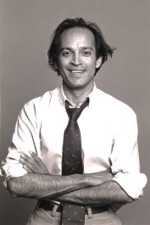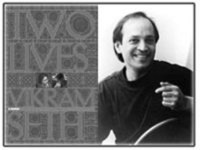| Author Profile
Vikram Seth
 Vikram Seth was born in Calcutta (now Kolkata); his family lived in a number of cities including the Bata Shoe Company town of Batanagar, near Calcutta, Patna and London, though never in Calcutta proper during his childhood, and he spent extended periods away at boarding school from the age of five. Vikram Seth was born in Calcutta (now Kolkata); his family lived in a number of cities including the Bata Shoe Company town of Batanagar, near Calcutta, Patna and London, though never in Calcutta proper during his childhood, and he spent extended periods away at boarding school from the age of five.
Having lived in London for many years, Seth now maintains residences near Salisbury, England, where he is a notable participant in local literary and cultural events, having bought in 1996 and renovated the house of the seventeenth century Anglican divine and metaphysical poet George Herbert[1], and in Delhi, where he lives with his parents and keeps his extensive library and papers.
Hybrid: The "novel in verse" The Golden Gate
The Golden Gate, English paperback edition
The first of his novels, The Golden Gate (1986), is indeed a novel in verse about the lives of a number of young professionals in San Francisco. The novel is written entirely in rhyming tetrameter sonnets after the style of Charles Johnston's 1977 translation of Aleksandr Pushkin's Eugene Onegin (although Eugene Onegin, both in the original Russian and in Johnston's translation, are in the Onegin stanza of iambic tetrameter). He had encountered it in a Stanford second-hand bookstore and it changed the direction of his career, shifting his focus from academic to literary work.
Novels in prose
A Suitable Boy
 After the success of The Golden Gate, Seth took up residence in his parents' house back in Delhi to work on his second novel, A Suitable Boy (1993). Though initially conceived as a short piece detailing the domestic drama of an Indian mother's search for an appropriate husband for her marriageable Indian daughter against the background of the formative years of India after Independence, the novel grew and Seth was to labour over it for almost a decade. The 1471-page novel is a four-family saga set in post-independence, post-Partition India, and alternatively satirically and earnestly examines issues of national politics in the period leading up to the first post-Independence national election of 1952, inter-sectarian animosity, the status of lower caste peoples such as the jatav, land reform and the eclipse of the feudal princes and landlords, academic affairs, inter- and intra-family relations and a range of further issues of importance to the characters. The Indian journalist and novelist Khushwant Singh has said of the novel that, "I lived through that period and I couldn't find a flaw. It really is an authentic picture of Nehru's India."[2] The novel was, despite its formidable length, a bestseller, and propelled Seth into the public spotlight and assured his reputation. English critics greeted A Suitable Boy with almost universal enthusiasm (notwithstanding its somewhat controversial passing-over for the Booker Prize shortlist), though it received mixed reviews from some American critics. After the success of The Golden Gate, Seth took up residence in his parents' house back in Delhi to work on his second novel, A Suitable Boy (1993). Though initially conceived as a short piece detailing the domestic drama of an Indian mother's search for an appropriate husband for her marriageable Indian daughter against the background of the formative years of India after Independence, the novel grew and Seth was to labour over it for almost a decade. The 1471-page novel is a four-family saga set in post-independence, post-Partition India, and alternatively satirically and earnestly examines issues of national politics in the period leading up to the first post-Independence national election of 1952, inter-sectarian animosity, the status of lower caste peoples such as the jatav, land reform and the eclipse of the feudal princes and landlords, academic affairs, inter- and intra-family relations and a range of further issues of importance to the characters. The Indian journalist and novelist Khushwant Singh has said of the novel that, "I lived through that period and I couldn't find a flaw. It really is an authentic picture of Nehru's India."[2] The novel was, despite its formidable length, a bestseller, and propelled Seth into the public spotlight and assured his reputation. English critics greeted A Suitable Boy with almost universal enthusiasm (notwithstanding its somewhat controversial passing-over for the Booker Prize shortlist), though it received mixed reviews from some American critics.
An Equal Music, English paperback edition
Seth's third novel, An Equal Music (1999), set in contemporary Europe, focuses on the lives of classical musicians and their music: so integral to the novel is the discussion by the characters of their performance repertoire (some of it very slightly obscure) that Seth successfully marketed a companion double CD containing performances of all the music referred to.
Seth credits his then-partner, the French violinist Philippe Honoré, as inspiring him with the idea for An Equal Music in an acrostic sonnet on Honoré's name which is the epigraph to An Equal Music:
Copyright
(R) thedailystar.net 2007 |
